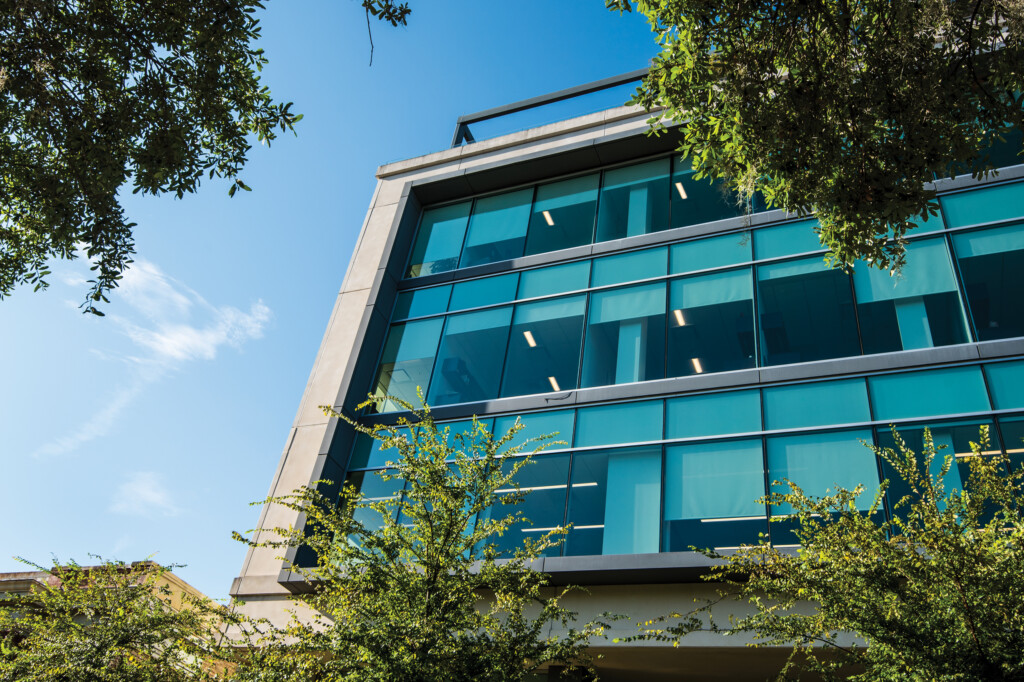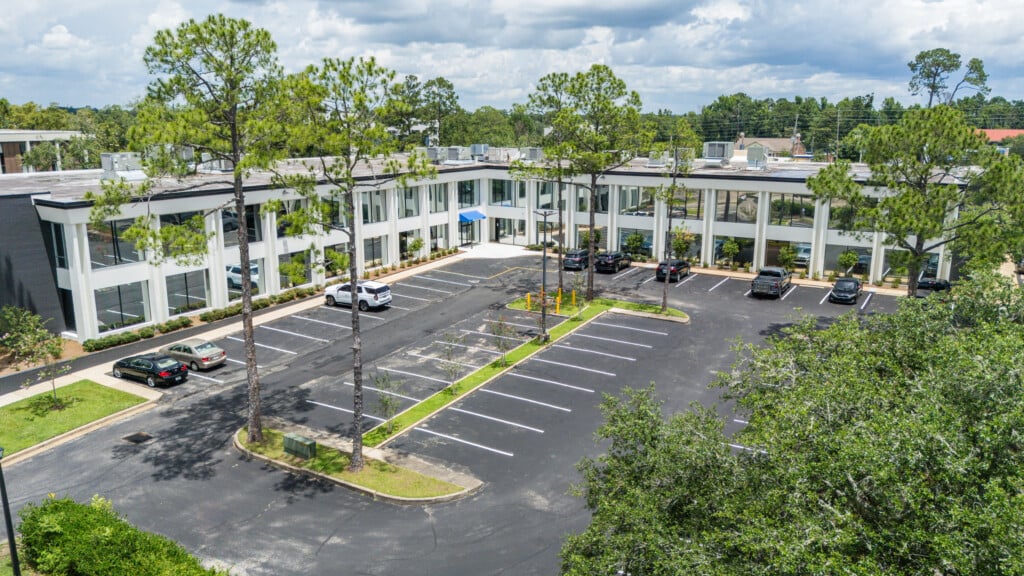Low Vacancy
Commercial real estate performing well in Northwest Florida

Shortly after getting into real estate 25 years ago, Stewart Proctor attended a seminar at which a gray-haired veteran of the business told relative newcomers how their career paths were likely to unfold.
In an interview, Proctor paraphrased what he heard long ago.
You’re gonna work for a firm and in the first five years, you are either gonna sink or swim. If you survive, you’re gonna flourish and at some point, you’re gonna decide that I can do this better my way, and you will break off from wherever you are and start your own business. Then, you’ll realize that you’ve become a small-business owner moreso than a real estate broker, and you’ll sell your company and get back to your roots.

Stewart Proctor (left) and J.R. Long (right) became part of Ciminelli Real Estate in October 2020. Photo by Erich Martin
For Proctor and his business partner, J.R. Long, that speech proved prophetic. “That is exactly what our trajectory has been,” Proctor said.
He observed that some people set out to own a business and may not really care what the business is. Others start a business as an extension of their passion for a particular industry or occupational field.
“My business partner and I do what we do because we like real estate, not necessarily because we love being small-business owners,” Proctor said. “We had 25 employees after we started and built up Structure Commercial Real Estate, and it got to where we weren’t doing a lot of active brokerage and consulting.”
The partners sold that company and got back to focusing on their roots as Proctor & Long Commercial Real Estate. Then, in October 2020, they were presented with an opportunity to become part of Ciminelli Real Estate Corporation, which is present in several large Florida markets and whose operations in the state are headquartered in Tampa.
The arrangement suits managing director Proctor just fine.

Some of their listings include the City Centre, which has up to 6,000 rentable square footage of flexible workspace available. Ciminelli handles leasing and facility management. Photo by Jennifer Ekrut
“We’re in charge of our own market and we effectively own our business, but we have all the support operations we need without actually having to have that staff on-site in Tallahassee,” he said. “All of our back-office marketing, our accounting department for property management, all of that is in Tampa, which allows us to focus on real estate.”
As to those professional steps the old man outlined, Justin Beck, vice president of Stirling, has followed them, too. In February, Louisiana-based Stirling acquired Beck Partners, including its offices in Pensacola and Tallahassee.
“I love putting deals together,” Beck said. “That’s where my happy place is. Between our two offices, we had 35 people in our organization and I didn’t know if I wanted to continue to manage an operation that size. I found myself spending a lot of time each day doing things that I don’t especially love to do.”
Beck started talking business with Stirling early in 2023.
“I was really impressed with them and their leadership team,” Beck said. “They have a culture that is very similar to the Beck culture, and that was very important to me.”
Stirling, Beck noted, is the largest commercial real estate company in Louisiana, has the largest such office in Mobile, Alabama, and now has the biggest one in Pensacola.
“Stirling has been good for our entire team and our customers,” Beck said. “We have more resources at our disposal, there are more growth opportunities for our people and we can extend better service to our clients. We’re a 200-employee business now. We went from managing 2 million square feet of property — not huge, but not small — to Stirling that has 24 million. Still, it’s a very flat organization. It’s not a big corporate bureaucracy; it’s not top-down. And it is very entrepreneurial.”
Both Proctor and Beck focus on office and industrial real estate. Business, they agree, has been good, but concerns loom.
“In 2021, we had a record year, as good as it gets,” Beck said. “Interest rates were at all-time lows, demand was high, and it seemed like everyone wanted to be in Florida, especially Northwest Florida. We had plenty to say grace over.”
In the spring of 2022, interest rates started to tick up and transaction volume started to decline.
“But in 2023, we did pretty well despite the interest rate environment,” Beck said. “It was led by leasing activity. Retail saw all-time highs in rents and occupancy. Industrial, same. Office, same. In Atlanta, Houston and Washington, D.C., they’ve got huge vacancies in office. Rents are dropping, and owners are having to make concessions. We don’t have any of that.”
Downtown Pensacola has been a particular success story. Vacancy rates there were a miniscule 3% throughout 2023, Beck said.
“We’ve done deals with folks who had a Mobile office and a Pensacola office, and they consolidated post-COVID in Pensacola. Businesses are expanding north from Central and South Florida, and they want to be in Pensacola.”
The Beck (now Stirling) team is active in multifamily and single-family residential development and land acquisition. Housing developers, Beck said, are still finding a way to make the numbers work.
“But because of the interest rate environment, we’re not going to see a ton of new products,” he said. “It’s more difficult now to develop than it was in 2021. Until we have some interest rate relief, I don’t think you are going to see much of a drop in construction prices. Multifamily is probably the one area where you can still make things pencil. Single family is difficult.”
Interest costs, too, are having a dampening effect. Beck explained that a single blanket policy covers all of what had been Beck properties.
“It was only a 16% increase this year,” Beck said. “Last year, it was a 45% increase, and the year before that, it was a 30% increase. Rates have increased, but where they are really getting us is on the insurable value.”
In Tallahassee, a market where volatility tends to be suppressed by a large percentage of public employment, Proctor’s experience has largely paralleled Beck’s.
The COVID-19 pandemic brought about a surge in office vacancy rates in Tallahassee, but occupancy has since rebounded.
“You’d be hard-pressed to find any available large blocks of office space outside of downtown,” Proctor said. “Our downtown market has always been a little more volatile than the suburban market. But even now, overall office vacancy rates are probably 5%.”
Industrial and office have seen a substantial increase in rental rates, Proctor noted.
“Rates don’t go up unless there is overdemand and undersupply,” he said. “Retail vacancy is less than 5%. As much as e-commerce is thriving, consumers still like a brick-and-mortar store. They still want to leave the house and go shopping.”
Insurance costs, in Proctor’s view, are the biggest threat to the market.
“They are escalating faster than rents can increase,” he said. “As much as commercial owners try to pass costs through, you have to be careful or you will start running tenants off or price yourself out of the market. The mom-and-pop business owners are the ones who will potentially take it on the chin. When insurance rates triple, it’s hard to stay out of the red.”
Said Proctor, “We’re gonna need some stronger legislation to solve the problem.”

DeeDee Davis, the broker/CEO at NAI Pensacola Commercial Real Estate recognizes that real estate is subject to cycles. Mini warehouses were sold in pre-market two years ago, but now residential development parcels are in high demand. Photo courtesy of DeeDee Davis/NAI Pensacola
DeeDee Davis, the broker/CEO at NAI Pensacola Commercial Real Estate, took a relatively circuitous route to her current position. A former state legislator, she worked for 25 years as a classroom teacher before entering the business world.
How would the one-time Florida lawmaker address the insurance problem?
“The state needs to provide more incentives for insurance companies to do business in Florida,” Davis said. “Insurance seems to be the one area of business where we haven’t rolled out the red carpet. The only thing that is going to bring rates down is more competition. Insurers are leaving the state, and granted, not every state gets hit with the ferocious storms that Florida sees, but there are plenty of natural disasters in other states, too.”
Davis said that from the fourth quarter of 2023 through the first quarter of 2024, at least a third of the property management clients she works with lost their insurance and had to scramble to find new coverage.
Davis recognizes that real estate is subject to cycles.
“Two years ago, it was mini warehouses,” she said. “They barely made it to market before they sold. People were looking for land to build mini warehouses. Now, we’re seeing a demand for residential development parcels. We don’t have enough apartments coming out of the ground to meet the demand right now, especially downtown. Usually, where there is growth in residential, commercial will follow. The reverse is happening downtown.”
Teaching remains an important part of what Davis does, but she likes a work life that is not subject to ringing bells.
“I really like the independence and flexibility that comes with my job,” she said. “I like to train others and watch them succeed. And making deals is fun, usually, but there’s not much low-hanging fruit out there anymore. If you can get a deal closed, you have earned it, I can assure you.”
At the mega-developer St. Joe, William Brock, vice president for commercial real estate, is responsible for leasing up company-owned properties.
“Right now, we’re primarily dealing with three developments — the Watersound and Watersound West Bay town center and our medical campus,” Brock said. “And, I’d add the Pier Park North shopping center.”
The West Bay center, currently in development, is in close proximity to the Latitude Margaritaville Watersound community. A little farther south on State 79, a medical office building is being constructed as part of a campus that will eventually include a full-service hospital.
“A lot of our decision-making about where and what to develop is based on residential rooftops,” Brock said.

William Brock, vice president for commercial real estate at St. Joe, is primarily focused on the Watersound® Town Center, Watersound West Bay Town Center, Watersound Town Center Medical Building, and Pier Park North shopping center. Photo courtesy of The St. Joe Company
“Currently, we have a little over a million square feet of commercial space that has been developed, and that is approximately 95% occupied. We have another 1.2 million square feet planned at the town centers and the medical campus. Of that amount, about 200,000 square feet has been built or is under construction. We have a significant runway ahead of us.”
Land-rich St. Joe largely refrains from selling parcels to others for development, preferring recurring sources of income.
“In Bay, Walton and Gulf counties, we are into monetizing our land holdings,” Brock said.
Slaton Murray, principal/executive commercial advisor at NAI Talcor in Tallahassee, shares the concerns cited by peers about the growing burdens presented by increasing real estate taxes and insurance premiums, but he feels fortunate to be doing business where he does.
“Business is steady here,” he said. “Leasing is holding strong, likewise rental rates and vacancy rates are low across asset classes. Office in a lot of markets seems to be struggling, but because we are so anchored by state government and three institutions of higher learning, we’re not seeing the kind of vacancies that exist elsewhere.”
Tallahassee, Murray noted, is a strong student housing market that yields a lot of private investment. Especially on its east side, Tallahassee is seeing significant residential development near the new Amazon fulfillment center.
“Something very encouraging for us in Tallahassee is that state government, including FSU and city/county government, will be bringing approximately $2.5 billion in construction to the city in the next three to five years. We love seeing that because a lot of these projects use local contractors, vendors and businesses, and that creates jobs. Knowing that pipeline is out there is really encouraging for us.”
The High Cost of a Home
Affordability factor buffets residential real estate markets
As one would expect, some of the same factors impacting commercial real estate activity, notably inflation, insurance costs and interest rates, also affect residential sales volume.
Chip Hartung, the broker/owner at Coldwell Banker Hartung in Tallahassee, has been riding the currents in the world of real estate since 1979 when he first launched his firm. The business maintains a small commercial division but is focused primarily on residential home sales or, as they like to say, “Fulfilling the Dream of Home.”
For years prior to the COVID-19 pandemic, Coldwell Banker Hartung’s inventory and sales were steady, and the firm posted modest increases in sales from year to year.
“During COVID, we saw the market accelerate at a level we had never seen before,” Hartung said. “Prices increased, we saw multiple offers and buyers were paying over list price. A lot of that had to do with the fact that money was so cheap. Interest rates were so low that they triggered a real estate frenzy. Home prices pretty much doubled.”
Now, the frenzy has cooled.
“The great news was that we had a great run,” Hartung said in April. “The bad news is that today we’ve got high interest rates, low inventory and prices that are prohibitive for the younger generation of homebuyers. We’re paying the piper.”
Hartung said he is still seeing a lot of demand — people want to buy a home — but that desire is often frustrated by the affordability factor.
The Florida Panhandle has entertained many new arrivals from northern climes, who have joined in a migration, fueled by the work-at-home trend. In Tallahassee, Hartung said, Realtors find themselves working more often with migrants from South Florida, who are seeking relief from congestion, a slower pace of life and, relative to Miami prices, less expensive real estate.
“Here, they can get a little bit more land,” Hartung said. “A lot of buyers are making purchases in Gadsden and Jefferson counties. A friend of mine had a successful real estate business in South Florida, and he moved his family to a house on five acres in Jefferson County. They’re growing their own vegetables, and they are glad to be out of Miami.”
In Tallahassee, the scarcity and cost of developable lots suppress inventory.
“New construction in Tallahassee has been lagging behind other markets in the last five to 10 years,” Hartung said. “The cost to acquire land, the cost for engineering, the cost for infrastructure — by the time a builder had a lot that was ready to build on, it was $100,000. And you can’t build a $250,000 house on a $100,000 lot and make it work.”
A development that will affect residential real estate practices but does not apply to the commercial sector is the settlement, reached in March, in lawsuits filed by groups of home sellers against the National Association of Realtors and several major brokerages.
Plaintiffs contended that NAR rules governing homes listed for sale on its affiliated Multiple Listing Services (MLS) unfairly propped up agency commissions contrary to antitrust laws. NAR disputed the characterization of its rules as noncompetitive.
The effect of the settlement will be to decouple commissions; the seller’s agent and the buyer’s agent will be paid separately. And, there will be no more automatic offers of compensation in the MLS. Scripts, dialog and forms will be revised accordingly.
“As Realtors, we need to be more transparent in our interactions with buyers and sellers,” Hartung said. “Offers of compensation to buyers’ brokers and MLS are no longer allowed. I think, though, that most sellers will still want to offer compensation to buyers’ brokers.
“Also, Realtors are now required to use buyers’ brokers agreements when they work with buyers or show buyers houses. In practice, most Realtors adhere to these rules anyway. It’s more of a mechanical thing. Brokers are making sure they have the right conversations, and they are detailing them with written agreements. Things have got to be formalized and documented.”
Some industry analysts have predicted that the settlement will result in the greater use of alternatives to traditional brokerage.
“For those of us who have been in the business a long time, commissions have always been negotiable,” Hartung said. “We’ll see different models, but I think the traditional brokerage model will continue. There’s a place for discount brokers and flat-fee brokers. And there is a place for full-service operations — in real estate, dentistry or other professions. That’s the American way.”



![Gettyimages 1015776190 [converted]](https://www.850businessmagazine.com/content/uploads/2024/09/n/i/gettyimages-1015776190-converted-1024x748.jpg)



